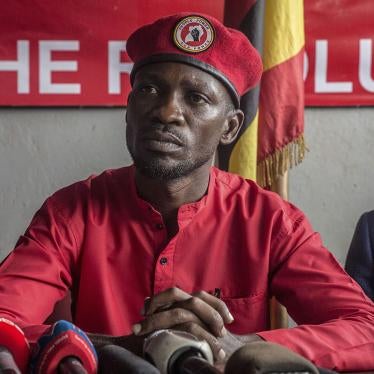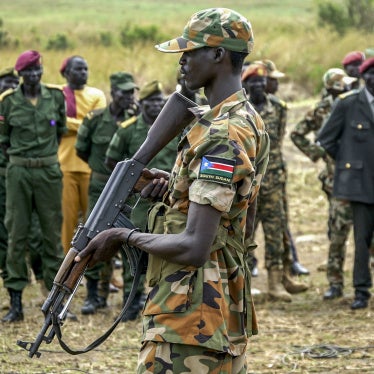I am writing to express the concern of HRW at the recent trial and conviction of Mohamed Lemine Chbih Ould Cheikh Malainine and two colleagues on charges of "criminal conspiracy". We call for their unconditional release from prison.
Human Rights Watch is concerned that the charges against Chbih Ould Cheikh Malainine, Mokhtar Ould Haibetna and Bouba Ould Hassan, were politically motivated. A presidential candidate in the 1997 elections, Chbih is chairman of the opposition Popular Front (Front Populaire, FP). He was arrested at his home on April 8, 2001, accused of being involved with alleged terrorist groups, and an alleged Libyan coup plot. It appears that there was little if any substantive evidence to back these charges.
On June 14, Malainine was convicted on these charges and sentenced to five years in prison. His lawyers plan to appeal the judgment. We urge you to ensure that any appeal is heard without any appearance of interference from the executive branch of government. Malainine's lawyers should be assured the rights they are due under international law to free and confidential consultation with their client and to represent him in court without harassment.
His case was heard in Aioun, about 800km south-east of the capital, Nouakchott, following protests in Nouakchott where it should normally have been heard. Security forces used teargas to disrupt a rally in Nouakchott on April 25, 2001, organized by the Popular Front to protest the arrest. Following his transfer, the lawyers representing Malainine temporarily withdrew in protest, citing interference in their right to communicate with their client, though ultimately a team of sixteen lawyers led by the president of the bar council formed the defense team at the trial. The trial was held under close police surveillance and there are serious concerns about lack of respect for due process during the proceedings. Evidence presented against the defendants consisted of their own signed statements, which they alleged had been obtained under duress, and two prosecution witnesses dismissed by the court as unreliable. Two of the judges hearing the case withdrew from the court at different times in contravention of court procedure. We are also concerned that trial observers from the Fédération internationale des ligues des droits de l'homme and the Moroccan Bar Association were prevented from attending the trial.
The Popular Front charged in a statement on May 10, 2001 that Cheikh Malainine had been subjected to "intense interrogation" when he was first arrested. The conditions in prison in Aioun, where he is still held are very poor. We urge you to ensure that these allegations are investigated and that Malainine is held in conditions conforming with international standards of detention.
The trial of this opposition leader highlights ongoing harassment of figures perceived to be in opposition to the government in Mauritania. We are concerned that your government has in the last year stepped up repression by curbing press freedom, banning the Union des forces democratiques-Ère nouvelle party, led by Ahmed Ould Daddah, and teargassing and disrupting public protests. Last year several opposition members were detained, including Daddah. In 1998, Daddah was detained for several weeks after speaking at a rally at which he accused the government of planning to accept Israeli nuclear waste for dumping.
Two of the main human rights organizations in Mauritania, SOS-Esclaves and the Association Mauritanienne des Droits de l'Homme (AMDH) are not able to function effectively because they have been denied registration by the government. In 1998 leading figures of the two organizations were convicted and sentenced to thirteen months in prison, under a 1973 law which criminalizes administration of or membership in "unauthorized organizations," although those convicted were released from prison after several weeks.
We also call on you to ensure that harassment of human rights and opposition activists ceases. Only where there is genuine evidence of involvement in recognizable criminal offenses should charges be brought against any individual.
No one has yet been brought to justice for the mass campaign of torture, abuse, and dispossession of the land and property of Afro-Mauritanians in the late 1980s and early 1990s, which led to the forcible expulsions of thousands of Afro-Mauritanians. Human Rights Watch also urges you to end impunity for these abuses and bring to justice those alleged to be responsible. In addition, we call on you to take more active steps to end slavery and slave-like practices in Mauritania.
Sincerely,
Peter Takirambudde
Executive Director
Africa Division







